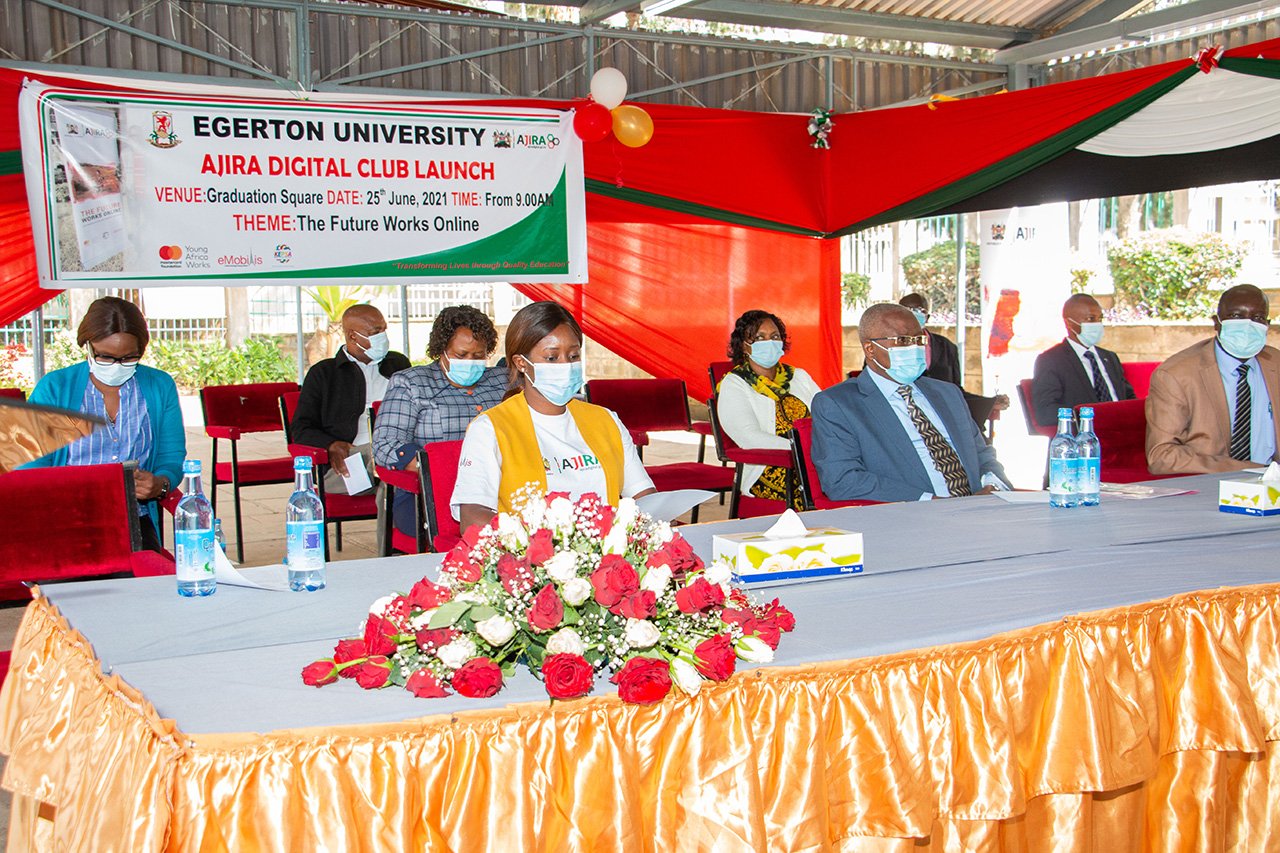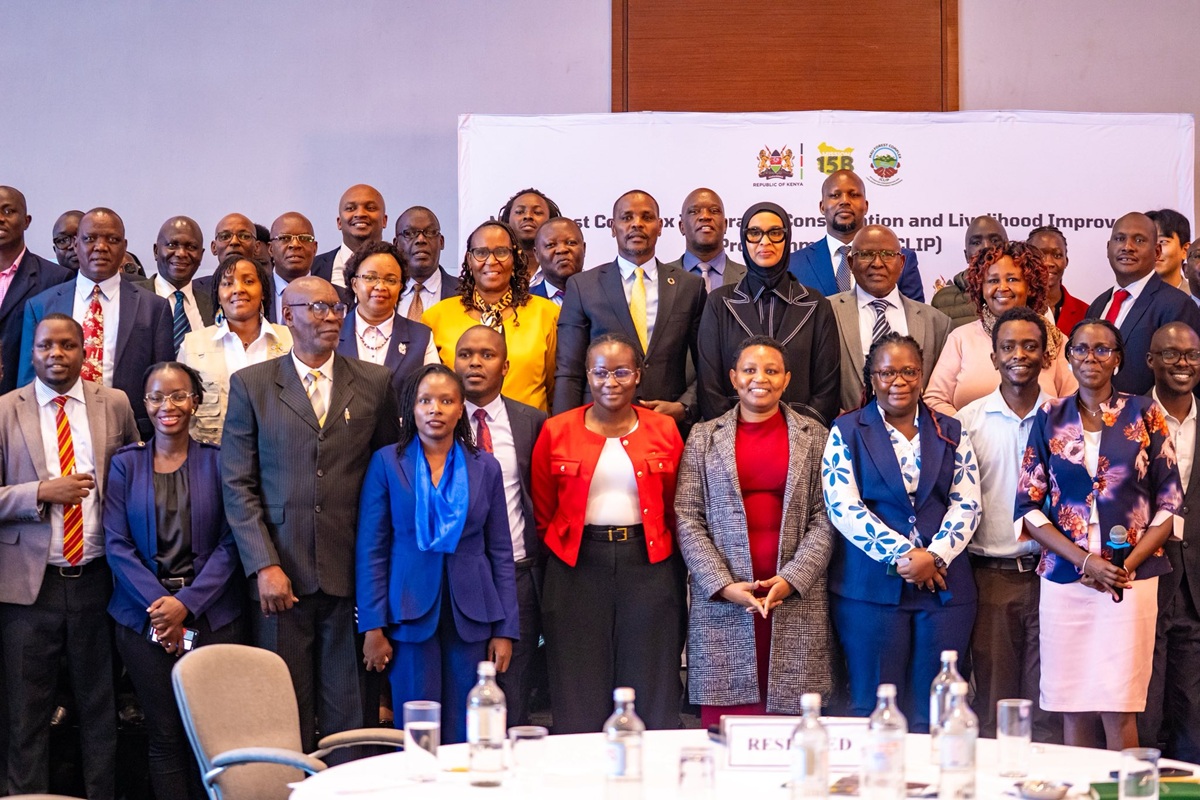Your stay at Egerton is very short and hence we advise that you use your time well. Your time here will be varied from 3-5yrs depending on which diploma or degree program you are admitted.
Prof. Isaac O. Kibwage Ag. Vice-Chancellor
As Government, we believe that "Digital work is work" and that the gig-economy workstream is similar to any other job that demands a high level of professionalism, commitment and hard work. Therefore, we need to constantly remind our youths to keep fast-tracking their digital skills in exploring the gig economy's possibilities.
Cabinet secretary, Ministry of ICT, Innovation and Youth Affairs
Delivered on Friday, 25th June 2021 At Egerton University Njoro.
SALUTATION:
Prof. Isaac Kibwage, VC Egerton University
Prof Kipkemboi - DVC Academic Affairs
Prof Mulwa-Dean of Student: Prof Odero
All other invited dignitaries
Ajira Digital Club Members and the student fraternity
Ladies and Gentlemen
Good morning!
- First, May I take this opportunity to thank each and every one of you for getting time to attend this important event-The Egerton University Ajira club launch. I want to extend special appreciation from my ministry to the Egerton University management led by Vice Chancellor Prof. Kibwage and the organizers of this function who are the Ajira digital program champions for a job well done in planning and organizing today’s function.
- The Ajira Digital Program, since its inception in 2016, has managed to empower thousands of youths across the country with employable skills that have enabled them to leverage and take advantage of the numerous digital job opportunities available. As we speak today, the country prides itself of slightly over one million digital workforce which is highly attributed to the efforts put forth by my ministry through the Ajira Program.
- Ladies and gentlemen, it is indeed a great pleasure to note that this university, having been among the first universities to have their students benefit from the program, has kept the fire burning in steering Ajira Digital Program activities within the campus. It is owing to your continuous and determined efforts that today we are gathered here to witness this Club launch. I therefore want you to know that indeed, when the history book of digital economy transformation in Kenya will be written, you surely will have a page in it!! So, part on your back for you are on the right side of history.
- As a Ministry and through the Ajira Digital Program we will continue to work closely with our partners to reach out to every Kenyan out there, both in and out of colleges, urging them to aggressively grab these opportunities that the program offers to enhance their skillset and subsequently earn a decent living through working on the digital and digitally-enabled jobs opportunities available within the digital workspace.
- Ladies and gentlemen, today’s event is a culmination of the ministry’s efforts in 2018 in which we initiated a partnership with higher learning institutions, and we started rolling out the Ajira Digital program in Universities/TVETs.It therefore gladdens my heart to report that among successful implementers of the program and whose student have greatly benefited is this university. In November 2018, we trained the Egerton University first cohort and about 100 students underwent a one-week intensive training on the Ajira Digital Program.
- Since then, we embarked on a series of engagement with the University and despite the Covid-19 pandemic, it is exciting to note that we have been conducting trainings through emobilis technologies-our implanting partners ,in which additional over 200 students have benefited from the program and a good number are now earning a decent income. Today, I am happy to report that we have several success stories within the University, and as witnessed earlier Ajira Digital program is indeed transforming lives of our youths. This is a true testimony of what the Ajira program is all about.
- Ladies and Gentlemen, as I stand before you today , I am glad to inform this gathering that through the Ajira Digital program, we have encountered several students from Egerton University both current and former who are earning a decent living. With your permission, ladies and gentlemen, allow me to mention a few of the Program’s student beneficiaries who are earning decently from online work opportunities : Maureen Chepkirui a former student is earning an average of Ksh.45,000 a month and is now a professional Transcriber in major transcription platform,Julius Wachira who works as a virtual assistant, Natasha Nadida working as a data entry expert and Grian Ngacha as social media expert who are both earning an average amount of kSh.10,000- 15,000 a month while being students of this great University.
- In an effort to progressively expand our efforts to implement the program better; we have hired over 200 Ajira Trainees as our Ajira Digital trainers, over 90 Center managers and mentors under our implementing partner eMobilis.Further, the ministry is working closely with Judiciary through the digitization firms, the Adept and Deproim technologies in providing transcription and digitization job opportunities to our Ajira Trainees. Indeed, the digitization and transcription excises have so far been pioneered in Mombasa, Kisumu and Nairobi law courts in which over 700 youths have already been hired and the plan is to eventually roll it in all the courts. I believe that this will be a great opportunity to all the Ajira Trainees seated here today and those prospecting.
- Ladies and Gentlemen, so allow me to make a special plea to all the students listening to me today, and who without any doubt are members of the Ajira Club, to focus on the digital skills being offered for free through the Ajira Digital Program by the Government. As you all know, the Covid-19 pandemic has hit hard the world, and people have been forced to work remotely from home. While many employees have been laid off, online workers have been thriving and their workspace is safe to conduct business and deliver services. Fellow Kenyans, it's now time to fully embrace technological changes and innovations to promote remote working as alternative employment. Globally, many countries invested a lot in online work and they are generating a lot of revenue in billions to their respective economies and that is our absolute goal as a country.
- As Government, we believe that "Digital work is work" and that the gig-economy workstream is similar to any other job that demands a high level of professionalism, commitment and hard work. Therefore, we need to constantly remind our youths to keep fast-tracking their digital skills in exploring the gig economy's possibilities.
- As a ministry, we have initiated several strategic programs that aim at promoting ICT know-how highly required to thrive in this fourth industrial revolution. Among such programs is "The Presidential Digital Talent Program (PDTP)", an internship programme that develops the ICT talent pool in Kenya through a collaboration between the public and private sectors. Every year, 400 fresh graduates are given a chance to intern for 12 months within Government setup and the private sector to gain hands-on skills in readiness to enter the job market. Today I wish to inform you that in the current cohort, we have several interns from Egerton University who have proved to be among the best skilled in their area of study.
- The Digital Literacy Program aims to introduce our young children to ICT skills at a young age with the fundamental goal of exposing them to technology and empowering them. This will see us instill the spirit and capabilities of innovation in our citizens, creating a more technologically vibrant generation in the next decade or so. Over 75,000 teachers from public primary schools have been trained and ready for full implementation of the program geared to increased national digital literacy levels and revolution of the country’s digital economy.
- Ajira Youth Empowerment Centers: To support our youth in their quest for digital learning and digital service delivery, the Ministry has partnered with the CDF to establish four Constituency Innovation Hubs, now known as Ajira Youth Empowerment Centers, in each constituency. The hubs are fully furnished with internet and furniture, and the youth are encouraged to visit the nearest CIHs and benefit from the facilities. I, therefore, challenge the students here to find out their nearest CIHs and utilize them.
- Huduma WhiteBox, the program is a one-stop-shop for anyone who wants to present/share/sell an idea, innovation, invention or solution. I urge every youth present to bring forward innovations and idea for support and promotion, priority will be given to products that focus on the Big 4 Agenda and address Government priorities and challenges. As Government we shall help you on how to protect and commercialize your innovations.
- Lastly, I wish to put more emphasis on Innovation and embracing of the gig economy for all Kenyan. World over, every great economy block have capitalized on the digital economy and Kenya will not be left behind but to lead the way for Africa. The Government through the ministry is in the forefront to ensure Konza Technopolis is completed in good time to promote the county’s economic pillar and woo investor to Kenya. I believe this is the route to a Kenyan "Silicon Valley”.
- With those few remarks, I wish to declare the Egerton University Ajira Digital Club officially launched. Thank you for you all and God bless you.
God bless you all.
Leadership is not about being appointed or elected to an office. Leadership is an attitude cultivated over time. It is about having aspirations beyond your wellbeing, working with others to advance the common good.
DR. NARENDRA RAVAL (GURU) - EBS CHANCELLOR
Delivered on Friday, 18th June 2021, During the 43rd Graduation Ceremony of Egerton University
There is a need to align staffing workload and enhance productivity. There is a widespread disparity in workload distribution with regard to teaching, administrative responsibility, research and community outreach.
Prof. Isaac O. Kibwage Ag. Vice-Chancellor
Delivered on Friday, 18th June 2021, During the 43rd Graduation Ceremony of Egerton University







